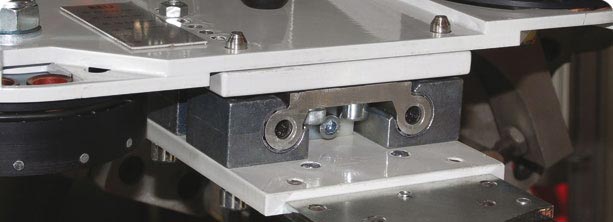
Maintenance-free and corrosion-resistant to dirt and cleaning with dry ice
Automotive industry: Flexible linear guide system for automatic welding cap changerThe investment in this cap changer for robot welding tongs is worth it. The system made extremely reliable by a purely mechanical design is only used in the automotive industry. It helps to reduce production costs in the long term. Robust linear guide systems with polymer sliding elements withstand the harsh usage and surrounding conditions.
“Altogether we already have around 1,800 welding cap changers in use worldwide,” reports Michael Geisler, the technical manager at REU Schweißtechnik GmbH in Baunatal, Hessen. Quickly and easily programmed, they can also handle various cap diameters, which preserves the shafts on the welding tongs. Due to encoding on the magazine support, it is impossible for a mix-up to take place when using different cap sizes. The welding cap changers are suitable for both horizontal and vertical use, as well as for stationary welding tongs.
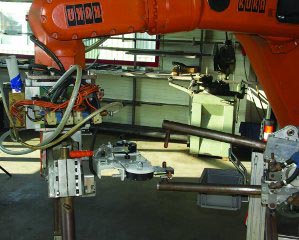
Maintenance-free linear technology for welding robots: the production process is not interrupted when changing the welding caps.
For several years, “DryLin® W” linear plain bearings from the bearing specialist igus® GmbH, Cologne, have been used in mechanical cap changers. The design of the guide system allows extremely high flexibility in the construction and a simple installation by the application of individual or double rails. Hard-anodized aluminium is used as rail material and provides very good friction and wear results. As no lubricants are needed, the whole system is resistant to dirt. Double rails in size 16 mm are used in the application. “In the meantime we have already fitted 1,400 of these linear guide systems. They are robust and work so well that so far we haven't had to order a single replacement part,” says Michael Geisler.
“DryLin®” involves an extensive range of maintenance and lubricant-free linear plain bearings in four main different groups. Besides not needing oil and grease, the focus is also on the robustness and resistance to factors like dirt, water, chemicals, heat and impact. These benefits come into their own in the automotive industry among others. The modular “DryLin®” kit is also continually growing, meaning that ever new application fields can be opened up.
For example, “DryLin® T” profile guide rails have proved effective in EURO-C welding tongs. The welding tongs are used for spot welding car body parts. Due to the welding spatter and dust, the use of the extremely dirt-repellent igus® T linear guide system finds the balance between high service life and low costs. The system is now used by almost all manufacturers. And “DryLin® R” linear plain bearings are also widely used in the field of automotive equipment. Their dimensions are compatible with standard ball bearings. The special geometry guarantees ruggedness even in extreme environments.
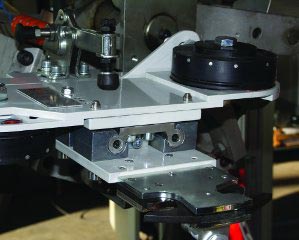
Flexible, lubricant-free “DryLin® W” linear guide system from igus® in the automatic welding cap changer
The company REU-Schweißtechnik GmbH was founded in 1985 with a patented process for recycling electrode caps. Since 1995 the company has been providing training in the area of resistance welding and also for MSG-welding since 2002. Its third main business is bringing welding tongs into service and optimising their parameters. “And for a few years our range has included the mechanical electrode cap changer. This in-house development is suitable for all robot welding tongs,” the technical manager explains. “The investment is relatively modest compared to motorized versions,” says Geisler. “Our system works without its own drive, we use the robot available. We achieve the best possible success with this solution. “
And this is how it works: The robot receives a message from the welding controls that the electrode's service life has been reached. The welding controls sends a signal via the PLC that a cap change is necessary. The robot moves to the cap changer, loosens the caps, fetches the new caps from a magazine, puts them in place and can continue its production process after 25 to 40 seconds. “Our aim is to make full use of the service life of electrode caps. Production therefore hardly ever stops,” points out Michael Geisler.
Electrode welding caps are pure consumables. They are changed every 2,000 to 10,000 spots depending on the application. Two caps are used in each electrode holder. As a rule, six changes a day take place, meaning that twelve electrodes are replaced per day on each holder. Many automotive manufacturers still change the caps by hand during breaks and downtimes on the transfer lines, whereby manual changes often cause damage and hence increased wear on the electrode shafts. In addition the procedure takes valuable time. The time saved can therefore be used for more worthwhile activities such as maintenance and monitoring tasks. “The change does only take a few minutes, but with cycle times of around 30 seconds in car body construction and six changes a day, you can soon work out how soon our appliance pays for itself,” Michael Geisler explains. The cost factor is in the low four-figure area and comes to approx. a third compared to driven systems.
To compensate for tolerances with the holder movement, the company first used elastic rubber buffers, which were fitted relatively rigidly. “After developing the system further, we now use linear technology, which not only guides in a defined manner, but can also withstand forces and always goes back to the starting position,” says the technical manager. “They must also be resistant to external influences, such as dirt and dust. ” The linear plain bearings must work OK with both magnetic fields, which emerge during welding, and with various cleaning agents, such as dry ice.
Alongside the “DryLin® W” guide system, tribo-optimized polymer plain bearings are also used in the grippers. They replace aluminium plain bearings, which were extremely cost intensive in procurement and also had to be machined afterwards, as they were not available in the sizes required. “The polymer plain bearings are unbeatable in terms of cost and can be immediately used,” says Michael Geisler. “Open the bag, put them in place and the product is ready!”
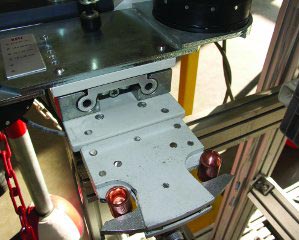
“DryLin® W” has proved itself over many years in cap changers and helps to prolong service lives.
Robust linear technology with polymer gliding elements As the welding systems are usually cleaned wet or with dry ice, one of the main issues on linear guide systems is corrosion-resistance. The rails, the housing bearings and the gliding elements must overcome these demands. This is where the incorporated lubrication in the “iglidur®” gliding elements pays off. The solid lubricants are embedded as microscopic particles in the millions of minute chambers of the solid, mostly fiber-reinforced material. The bearings release minute amounts of lubricants from these chambers. That is adequate to sufficiently lubricate the immediate surrounding.
The solid lubricants assist in reducing the coefficient of friction of the iglidur® bearing. They are not indispensable for the bearing's function, but have a supporting effect. As they are embedded in the minute chambers, they cannot be shoved aside. They always make their presence felt as soon as the bearing or shaft is set in motion. The lubricant is protected as long as possible from external contamination and can therefore constantly release its full effect. In this example, “iglidur® J200” is used as a material, which is a specialist for very low coefficients of friction and minimal wear on anodized aluminium shafts. Saving on raw materials, which includes the environmental issue, also plays an important role in this context. Just as the welding caps are changed precisely, the guide system does not need any additional lubrication either, which ultimately has a positive effect on the environment. “You can rely on the system permanently over the long term. No manpower has been necessary since the installation to maintain the guide system,” Michael Geisler points out.
The spiritual father of the mechanical cap changer at REU Schweißtechnik, Werner Kaeseler, and the workshop and design manager Heinz-Peter Drießen, were impressed by the resistance of the robust polymer bearings to dust and sand several years ago at the Hannover Messe. “Just one year later we had the right application. The way we use the product today, there is no alternative to linear technology – either on commercial or technical grounds. We assemble it ourselves, as we cut the guide rails to the exact length in our workshop and then drill the appropriate holes. ” Michael Geisler adds: “Our customers are thrilled by the overall concept. It is simple and works without any problems. The demands in the automotive industry on the materials being welded are getting ever greater. At the same time the welding time should be as short as possible. Savings are even possible here in the millisecond range. We have created a database containing very many component combinations. As a result we now can say with conviction, with which parameters work should be carried out and exactly when an electrode has to be changed. ” igus® also provides such a database; the constructor can exactly determine the service life of the “DryLin®” linear technology in its respective application in advance.
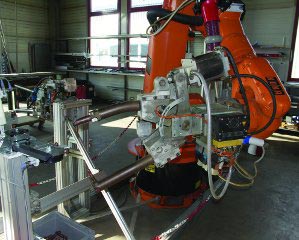
The entire electrode cap change is concluded after 25 to 40 seconds.